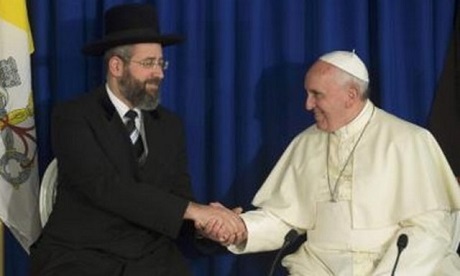Recently, we have been hearing Israeli and diaspora Jewish voices expressing disappointment at the Catholic Church’s reaction to the terrorist attacks of Oct. 7.
The claim is that the pope has not sufficiently condemned the crimes of Hamas and, furthermore, that he has created a symmetry between Hamas and Israel in his comments.
If that were not enough, apart from the pope, the church officials charged with dialogue with the Jewish people—first and foremost among them Cardinal Kurt Koch, head of the church’s Commission for Religious Relations with the Jews— have chosen thunderous silence, not responding at all to the horrific events that took place in Israel.
The Jewish expectation was that as the fruit of the blessed process of dialogue between the Catholic Church and the Jewish people, the church and its leader would stand by our side in our fight against the terrorism of Hamas.
It is not my interest here to enter into a debate with the criticism that is being leveled, and there might or might not be some truth in it.
Rather, I seek to present the issue within a broader context, that of interreligious dialogue between the Catholic Church and the Jewish people.
Interreligious dialogue, by its very nature, is expressed through formal institutions, whether they be those of the Jewish rabbinic establishment or those of the church.
At the same time, precisely because the dialogue is developing in positive ways, it inevitably breaks through the formal frameworks that have been established and is practiced in the best possible way — through people rather than through institutions, and through those who do not need an official role in the dialogue in order to talk to one another.
In other words, the most successful interfaith dialogue takes place between religious leaders who desire to talk to one another, rather than between those who are formally obligated to talk to one another.
When we began to realise the extent of the horrors of Oct. 7, many of my Catholic friends contacted me immediately because of their deep concern.
This concern was personal and human, and my friends also expressed genuine anguish for the Jewish people because of the tremendous crisis it was experiencing. Such concern, bursting from the heart, is dearer to me than a thousand official letters from senior bureaucrats in the church.
On the night of Oct. 7, I discovered that my friends in the Catholic Church do not simply engage in diplomatic relations with me. Rather, they are truly my friends and friends of the Jewish people.
One good example of the kind of friendship I am referring to was provided by Cardinal Pierbattista Pizzaballa, the Latin patriarch of Jerusalem.
He expressed himself in an exceptional way on Oct. 16, when he offered himself in return for the Israelis who had been kidnapped: “I am ready for an exchange, anything, if this can lead to freedom, to bring the children home. No problem. There is total willingness on my part.”
It was completely evident that his words were sincere, and the sorrow he expressed was completely authentic.
In all of Cardinal Pizzaballa’s statements, even those in which he expressed his deep concern for the residents of Gaza and criticised the practices of the State of Israel (perfectly logical considering that he is the patriarch first and foremost of his Palestinian flock), he continued to harshly condemn the criminal acts of Hamas on Oct. 7. Continue reading
- Guy Alaluf is an Israeli Orthodox rabbi and teacher who researches the relationship between Judaism and the Catholic Church. He leads the Daath and Tvuna (Knowledge and Understanding) Orthodox Jewish Community in Rosh HaAyin, Israel.
News category: Analysis and Comment.




